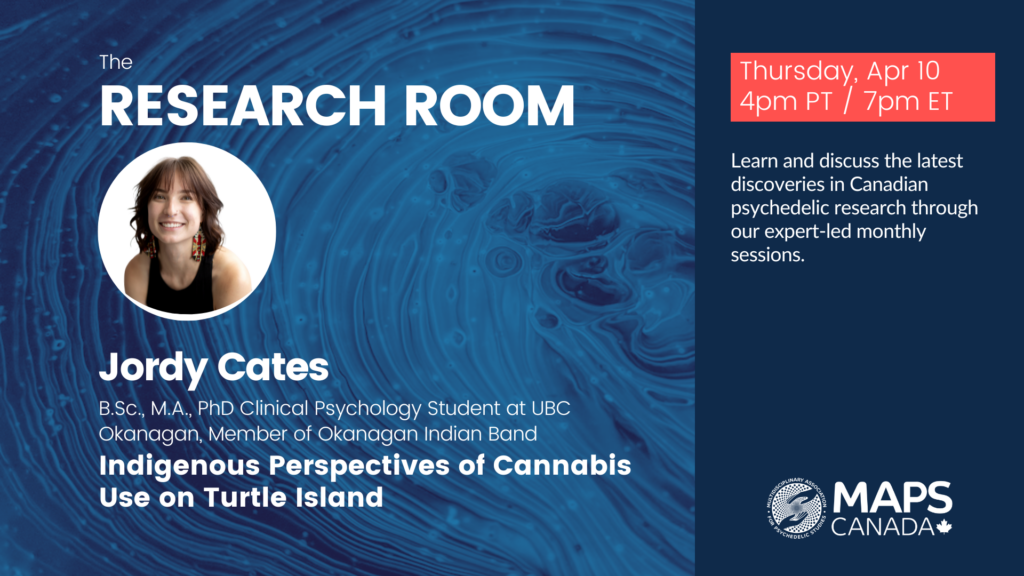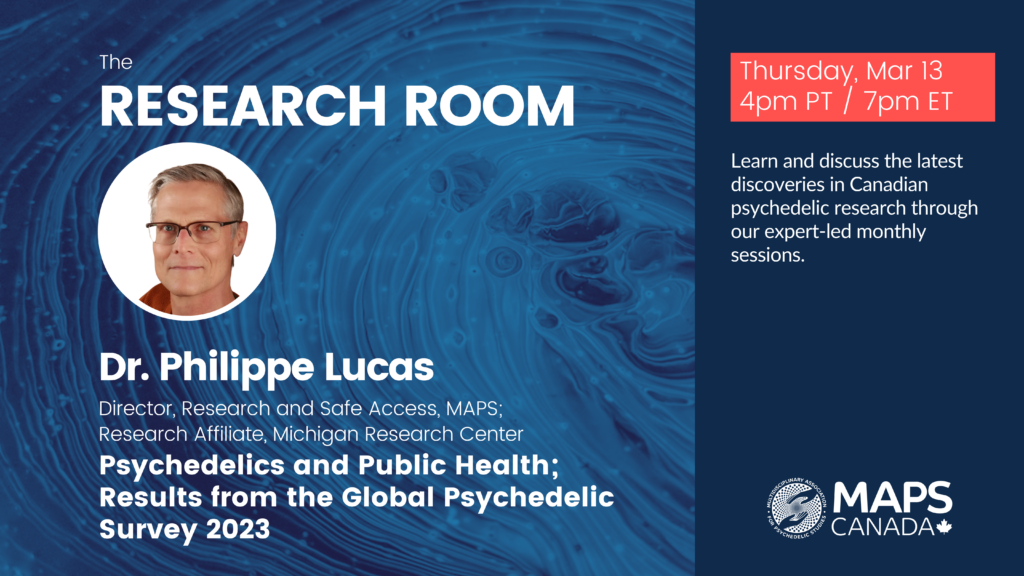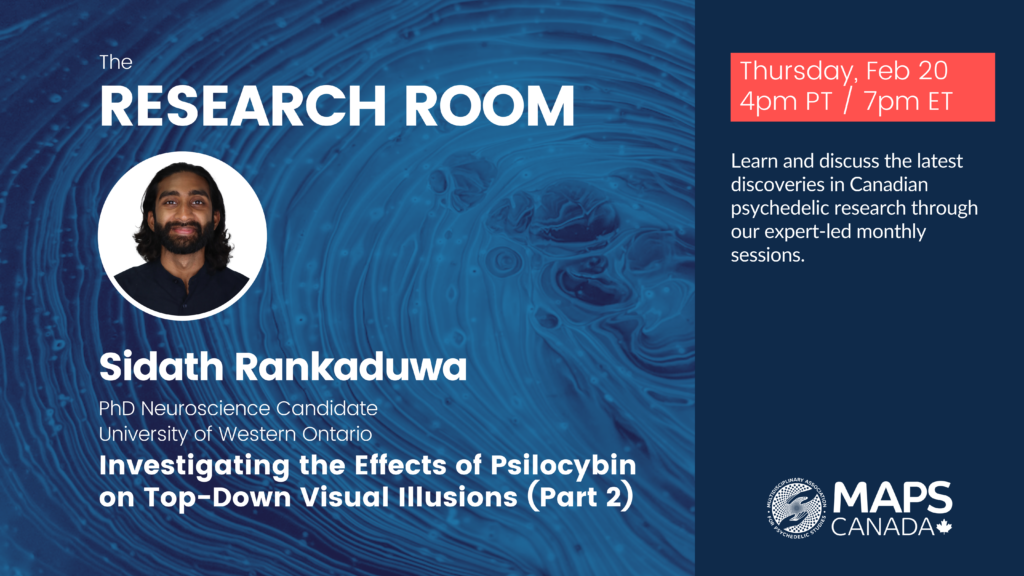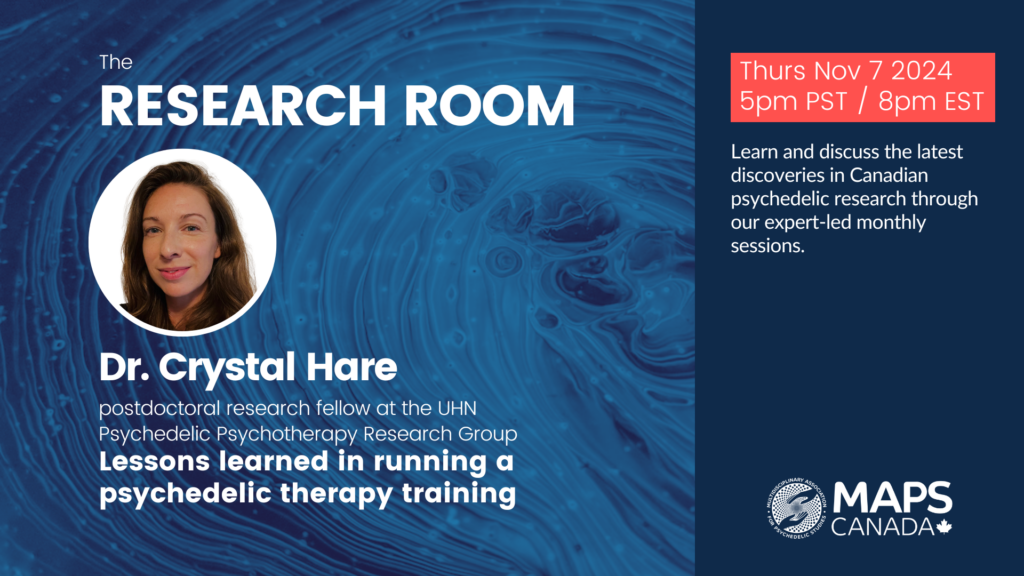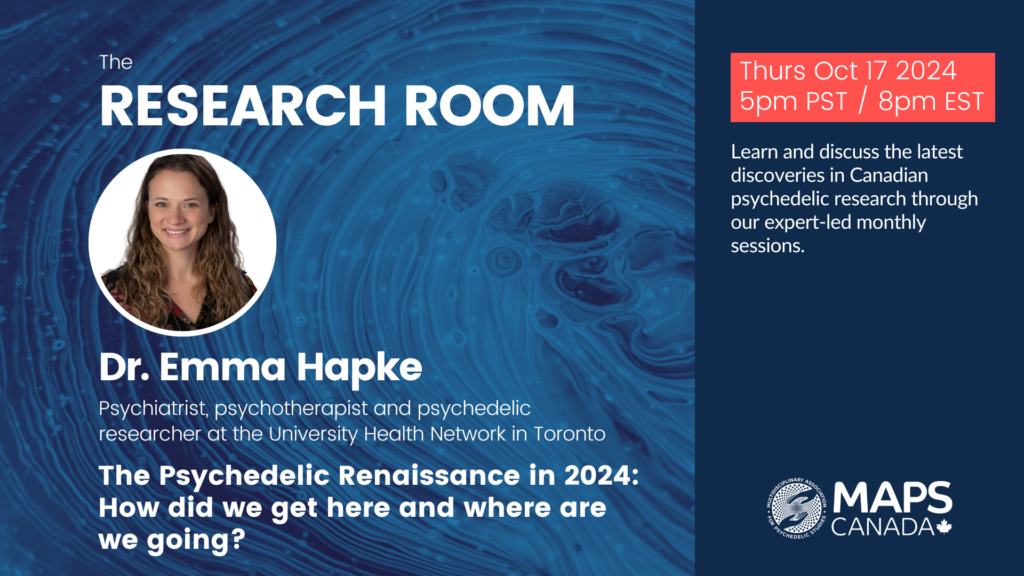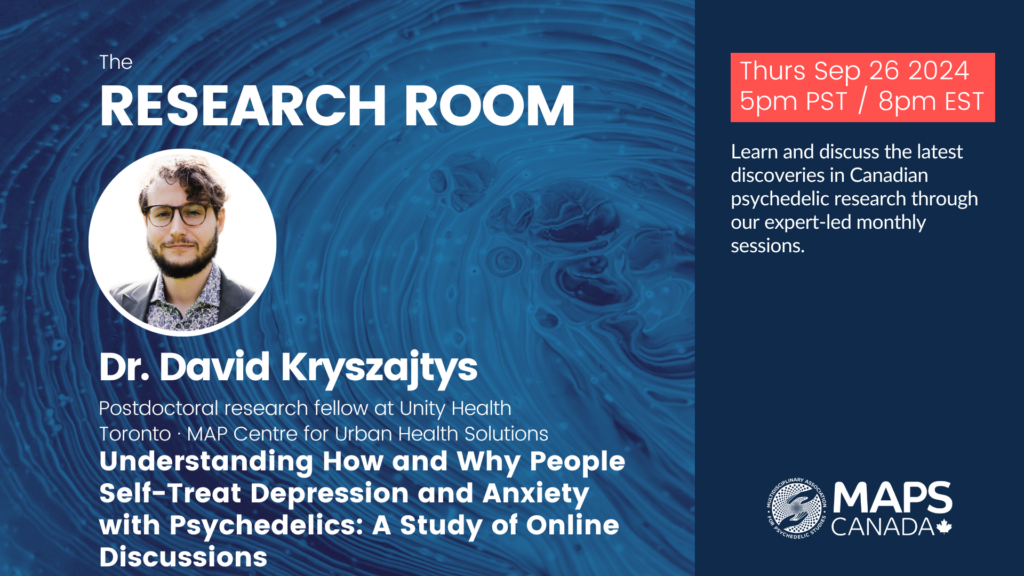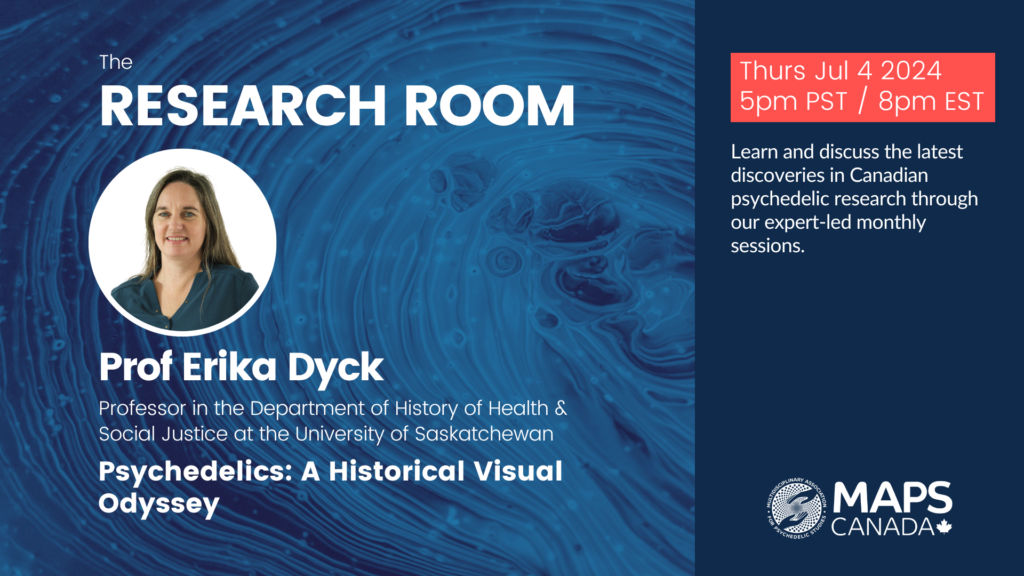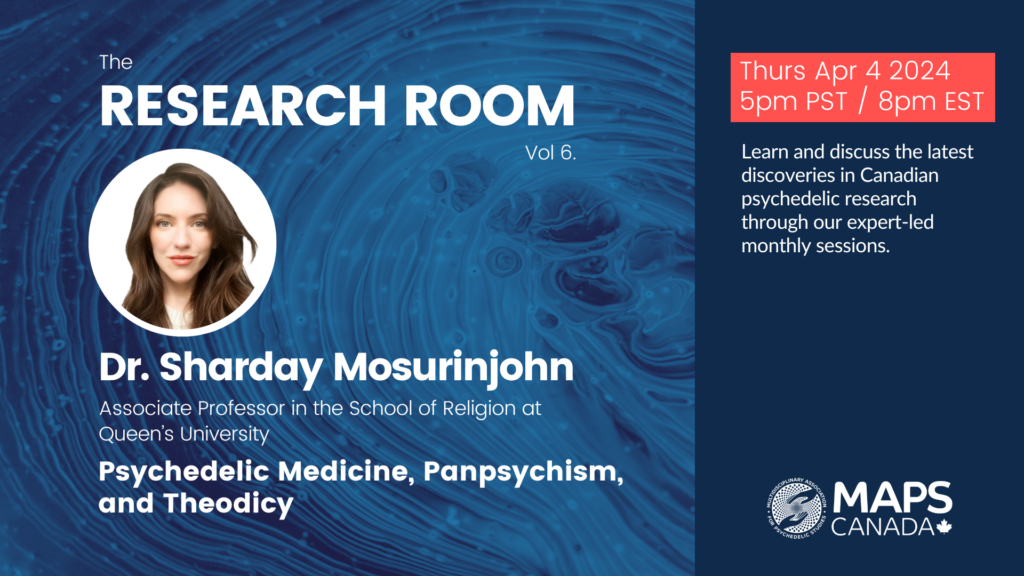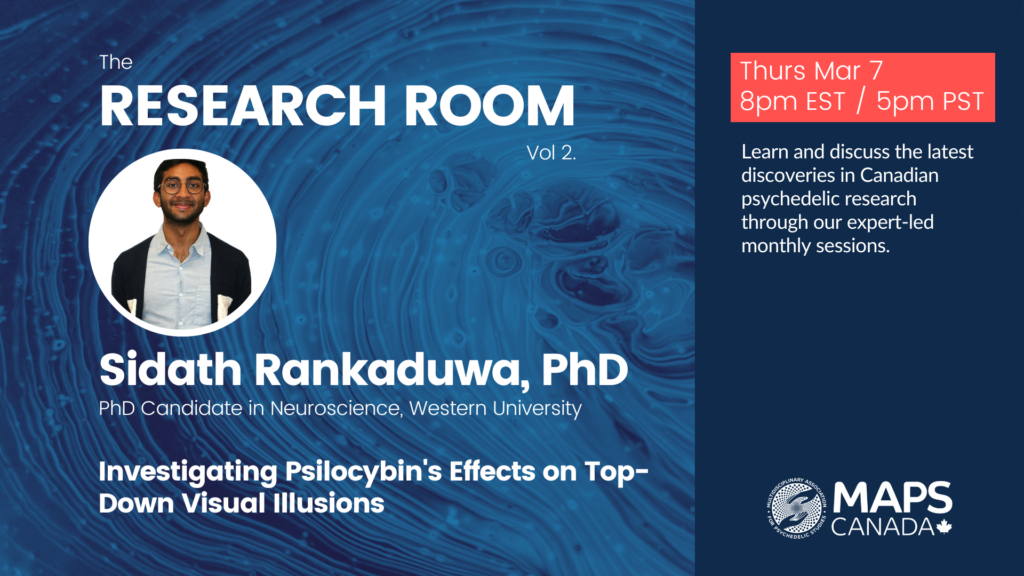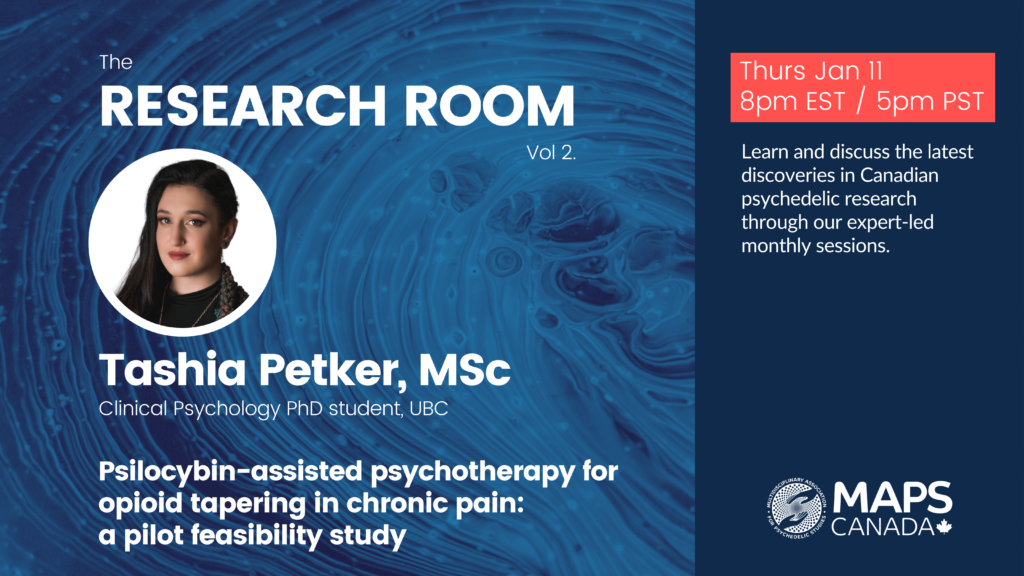Interested in learning from Canadian researchers at the forefront of psychedelic science? Consider this your invitation to join the Research Room, our monthly online expert-led series. Register for free today!
The MAPS Canada Research Room is a monthly webinar series dedicated to showcasing cutting-edge Canadian research across diverse disciplines within the burgeoning field of psychedelic studies. Our mission is to democratize access to psychedelic science, and fostering inclusivity through knowledge translation and dissemination of academic knowledge in a more accessible manner.
Each research room session is an hour long, and provides researchers a platform through which they can dynamically engage with the audience about their current research.
Interested in presenting or would like to see someone present? Click here for to sign up.
For more information email us at: researchroom@mapscanada.org
- Meetings are held on Zoom
- First Thursday of every month, 7 PM ET (4 PM PT) (see note)
- Anyone with an interest in psychedelic science and research, anywhere in the world, is welcome to attend.
UPCOMING SESSIONS
MAPS Canada Research Room presents:
Indigenous Perspectives of Cannabis Use on Turtle Island
Jordy is a member of Okanagan Indian Band and a 1st year PhD student in the Clinical Psychology program at UBC Okanagan (UBCO). She started working with Dr. Zach Walsh in 2019 through the Indigenous Research Mentorship Program at UBCO. She competed her BSc in Psychology with a minor in Biology in 2021 and her MA in Clinical Psychology in 2024. Her Masters project focused on Indigenous perspectives of cannabis use. Her doctoral research is focused on the microdosing of psychedelics. More broadly, her research focuses on substance use, Indigenous research methods, drug checking, and harm reduction. She is a co-founder of the @UBCO.AISES group which aims to provide networking opportunities and foster community for Indigenous STEM students.
Talk Abstract
Since the legalization of adult recreational cannabis use in Canada, Indigenous leaders have made numerous calls on the provincial and federal governments for adequate and appropriate consultation regarding the Cannabis Act. These calls parallel the narrative surrounding research with Indigenous communities, which have historically enacted Western methods, often leading to non-collaborative approaches or exclusionary dynamics. This study brings together Indigenous researchers, substance use experts, and representatives from Indigenous communities and organizations to provide a platform for Indigenous perspectives on cannabis. Guided by Two-Eyed Seeing, in conjunction with Wilson’s (2008) circular research paradigm, this mixed-methods study explores what Indigenous Peoples think about cannabis use, what motivates them to use it, how it is used as a substitute for other substances, the modes and patterns of use, the access of cannabis, barriers to health care, and the impacts of legalization. Our findings show that the majority of respondents consider cannabis to be a medicine. Cannabis was used for an array of reasons both within and between respondents, with most reporting both cannabis for therapeutic purposes (CTP) and cannabis for recreational purposes (CRP). Cannabis was used as a substitute for a variety of substances including, alcohol, stimulants, opioids, cigarettes, and benzodiazepines. It was predominately disliked due to the associated stigma. Similarly, almost half of the respondents reported experiencing discrimination from their doctor because of cannabis use. Overall, we heard that cannabis use was perceived as an approach to enhance overall well-being and was not generally considered problematic.
2025 PAST SESSIONS
MAPS Canada Research Room presents:
Psychedelics and Public Health: Results from the Global Psychedelic Survey 2023
Philippe Lucas, PhD is a cannabis and psychedelic researcher, and a lifelong safe access advocate. Following struggles as a medical cannabis patient, Philippe founded the Vancouver Island Compassion Society in 1999 and worked as its Executive Director until 2009. He then served a term as a Victoria City Councillor before being hired as VP, Global Patient Research & Access at Tilray, where he oversaw a comprehensive international clinical and observational cannabis research program. Currently, Philippe is Director, Research and Safe Access at the Multidisciplinary Association of Psychedelic Studies (MAPS) and a Researcher Affiliate at the University of Michigan’s Psychedelic Center, and he is the lead investigator of the Canadian Psychedelic Survey 2022 and the Global Psychedelic Survey 2023/25.
Philippe has worked with governments around the globe to develop evidence-based drug policies and has received a number of accolades for his patient research and advocacy, including the Americans for Safe Access Researcher of the Year Award 2021, the Cannabis Council of Canada Lifetime Achievement Award, and the Queen Elizabeth II Diamond Jubilee Medal.
MAPS Canada Research Room presents:
Investigating the Effects of Psilocybin on Top-Down Visual Illusions (Part 2)
Sidath “Sid” Rankaduwa is a PhD Neuroscience candidate from the University of Western Ontario (UWO), whose research focuses on the effects of psilocybin on visual processing and cognition. Before entering his PhD, he completed an MA in Philosophy at UWO specializing in consciousness studies and philosophy of mind. Sid has a longtime interest in Eastern philosophical traditions, and has helped develop and teach a course on Buddhist philosophy at UWO. Sid has been interviewed on various podcasts for his research on psychedelics, and was also himself part of the original team for the MAPS Canada Podcast, acting as the show’s first host. The primary question that motivates Sid’s research is, “What can altered states tell us about the nature of consciousness?”
Talk Abstract
The psychedelic state is sometimes described as a “higher state of consciousness.” But what could this mean, experientially — are there tests where a psychedelic user could perform better than a sober individual? Our visual system constructs the objects and scenes in our environment from basic features such as shape, texture, and motion; much of what we see, however, is also influenced by our prior expectations — this is called ‘top-down’ processing. Researchers have found that psilocybin (a classic psychedelic) alters perception by disrupting top-down processes, thereby reducing the influence of our brain’s expectations on perception. We can test this by observing how psilocybin affects well-understood cases of top-down vision. Many visual illusions, for example, are driven by our prior knowledge leading us to misperceive certain images: we might see two equal lines as differing in length, or observe a hollow mask as being convex. However, if psilocybin disrupts top-down processes, then perhaps a psilocybin user wouldn’t make these same errors — they might instead be able to make more accurate judgements on certain visual illusions. They might see two lines as being equal, when in fact, they are. By investigating how psilocybin users experience different visual illusions, we can determine to what extent psilocybin affects top-down vision. If individuals tend to make more accurate judgements under the influence of psilocybin, then this may be a unique situation where the psychedelic state is truly a “higher state of consciousness.”
2024 PAST SESSIONS
MAPS Canada Research Room presents:
Lessons learned in running a psychedelic therapy training
Thurs, November 7th 8pm EST / 5pm PST, 2024
Dr. Crystal Hare, C.Psych, PhD, is a clinical psychologist and postdoctoral research fellow at the UHN Psychedelic Psychotherapy Research Centre. Her clinical training is in health psychology, specializing in working with patients with chronic medical conditions. Her research focuses on improving quality-of-life in individuals living with life-threatening illness. She is a teaching assistant and student liaison for the Michener Foundations of Psychedelic Psychotherapy course. Crystal’s aspirations in this field are to help establish standardized psychedelic-assisted psychotherapy protocols in order to enhance treatment outcomes, and to help establish best practices for training of psychedelic therapists, with a focus on understanding the educational components most necessary to prepare therapists to work safely and ethically in this field.“
MAPS Canada Research Room presents:
The Psychedelic Renaissance in 2024: How did we get here and where are we going?
Thurs, October 17th 8pm EST / 5pm PST, 2024
Emma Hapke, MD, FRCPC, is a psychiatrist, psychotherapist and psychedelic researcher at the University Health Network in Toronto. She is the co-founder and associate director of the UHN Psychedelic Psychotherapy Research Group. She has expertise in women’s mental health, the treatment of trauma, psychosocial oncology and psychedelic-assisted psychotherapy. Dr. Hapke worked with MAPS as the principal investigator for the Montreal site of the phase 3 trial of MDMA-assisted psychotherapy for PTSD. She is also the co-founder and co-director of the Michener Foundations of Psychedelic Psychotherapy Program. She currently leads research projects on psilocybin therapy for end-of-life distress and caregiver distress, experiential training of psychedelic therapists and surveys of psychedelic use in the community.
MAPS Canada Research Room presents:
Understanding How and Why People Self-Treat Depression and Anxiety with Psychedelics: A Study of Online Discussions
Thurs, September 19th 8pm EST / 5pm PST, 2024
Dr. David Kryszajtys is a Post-Doctoral Fellow at the MAP Centre for Urban Health Solutions, Unity Health Toronto, with a PhD in Public Health Sciences from the University of Toronto. He studies how social and psychological factors—such as personal experiences with healthcare and cultural attitudes—compel people to make certain decisions about their health and use of healthcare. His research reveals important considerations for improving policies and practices that can enhance individual well-being and overall public health, particularly in mental health, addiction, and substance use. Alongside his research on psychedelic self-treatment for depression and anxiety, Dr. Kryszajtys has evaluated harm reduction programs to better support people who use substances. His work has been published in leading journals and presented at conferences worldwide.
MAPS Canada Research Room presents:
Psychedelics: A Historical Visual Odyssey
Thurs, July 4th 8pm EST / 5pm PST, 2024
Erika Dyck is a professor and a Canada Research Chair in the History of Health & Social Justice at the University of Saskatchewan. She is the author or co-author of several books, including Psychedelic Psychiatry (2008); Facing Eugenics (2013); Managing Madness (2017); Challenging Choices (2020); and Psychedelics: A Visual Odyssey (2024). Erika is the co-editor of two McGill-Queen’s University Press book series on the history of medicine and Intoxicating Histories. She is currently the President of the Alcohol and Drugs History Society.
MAPS Canada Research Room presents:
Psychedelics for Veterans in Canada: Special Considerations
Dr. Ronald Shore, MPA, PhD., is a Research Scientist with Queen’s Health Sciences, an Assistant Professor in the Department of Psychiatry, Queen’s University and a Scientific Advisor to the Canadian Institute for Military and Veteran Health Research. Ron is an Investigator and Lead Therapist at Queen’s in a trial of psilocybin plus motivational enhancement therapy for alcohol use disorder. His PhD is specific to the clinical application of psilocybin. Dr. Shore is also faculty in the Michener Institute’s Foundations of Psychedelic-assisted Therapy educational program and is the founder of Kingston’s Street Health Centre.
MAPS Canada Research Room presents:
Psychedelic Medicine, Panpsychism, and Theodicy
Thurs, April 4th 8pm EST / 5pm PST, 2024
Sharday (she/her) is an Associate Professor in the School of Religion at Queen’s University, Kingston ON, where she researches and teaches on esotericism, occult sciences, and new religious movements. She is interested in working with, and enlivening integrative, non-mechanistic worldviews found within these traditions. Her first book is ‘The Spiritual Significance of Overload Boredom’ (2022; McGill-Queen’s University Press). Her major projects right now are about psychedelic spiritual crises and solutions. With multidisciplinary collaborators, she is synthesizing tools for facilitating and navigating existential distress, recovery and maps for meaning-making. This work begins from a cosmophilic starting point, centring epistemologies of direct gnosis from traditional communities of practice, and integrating academic scientific and humanistic epistemologies. Sharday is involved in a number of academic and other organizations: she is a founding member of the Human Augmentation Research Network, she holds leadership positions at the American Academy of Religion, and she has been Director of Research at the Psychedelic Association of Canada.
MAPS Canada Research Room presents:
Psilocybin's Effects on Top-Down Visual Illusions
Thurs, March 7th 8pm EST / 5pm PST, 2024
Sidath Rankaduwa: Sid is a PhD Neuroscience candidate from the University of Western Ontario, and his research is currently investigating the effects of psilocybin on visual processing and cognition. Before entering his PhD, he completed an MA in Philosophy at Western University specializing in consciousness studies and philosophy of mind. Sid also has a longtime interest in Eastern philosophical traditions, and has helped develop and teach a course on Buddhist philosophy at Western. Sid has been interviewed on various podcasts for his research on psychedelics, and was also part of the original team for the MAPS Canada podcast, acting as its first host. The primary question that motivates Sid’s research is, “What can altered states tell us about the nature of consciousness?”
MAPS Canada Research Room presents:
Psilocybin-assisted psychotherapy for opioid tapering in chronic pain: a pilot feasibility study
Thurs, Jan 11th 8pm EST / 5pm PST, 2024
Tashia Petker is a PhD student in the Clinical Psychology program at the University of British Columbia. Tashia previously completed her undergraduate and master’s degrees in Psychology & Neuroscience at McMaster University while working in the Peter Boris Centre for Addictions Research. Tashia has extensive experience as a clinician and researcher working in treatment centres for people experiencing complex mental health issues, marginalization, and homelessness. She is currently doing qualitative and clinical research in psychedelic-assisted psychotherapy, and is a study therapist for a phase 2 trial of psilocybin for alcohol use disorder.

